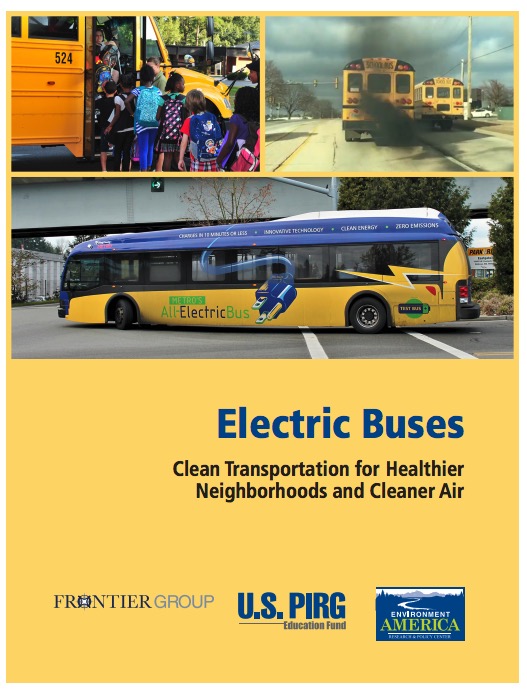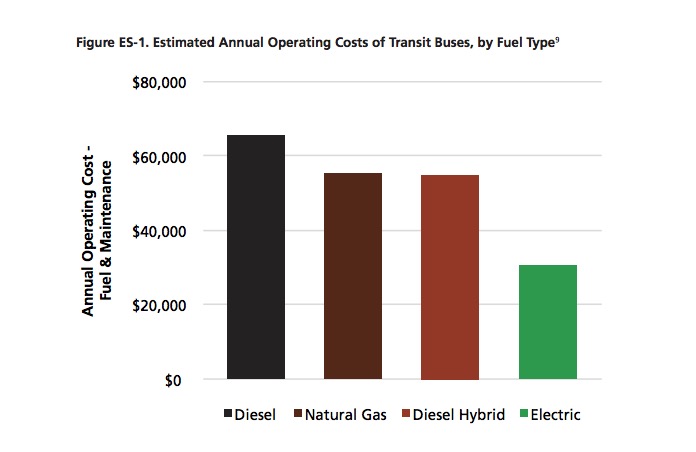FRONTIER GROUP
U.S. PIRG
ENVIRONMENT AMERICA
Executive Summary:
Electric Buses: Clean Transportation for Healthier Neighborhoods and Cleaner Air
 Buses play a key role in in our nation’s transportation system, carrying millions of children daily to and from school and moving millions of Americans each day around our cities. Buses reduce the number of individual cars on our roads, make our communities more livable and sustainable, and provide transportation options for people of all ages and abilities.
Buses play a key role in in our nation’s transportation system, carrying millions of children daily to and from school and moving millions of Americans each day around our cities. Buses reduce the number of individual cars on our roads, make our communities more livable and sustainable, and provide transportation options for people of all ages and abilities.
Yet, the majority of America’s buses remain dirty – burning fossil fuels like diesel that put the health of our children and communities at risk and contribute to global warming:
- Approximately 95 percent of America’s school buses, carrying some of the most vulnerable passengers, run on diesel.
- More than 60 percent of the nation’s nearly 70,000 transit buses run on diesel, and another 18 percent run on natural gas, while just 0.2 percent of buses are all-electric.
Numerous studies have shown that inhaling diesel exhaust can cause respiratory diseases and worsen existing conditions like asthma. The negative effects are especially pronounced in children.
- Diesel exhaust is internationally recognized as a cancer-causing agent and classified as a likely carcinogen by the U.S. Environmental Protection Agency.
- In a study of 61 million people in 2015, researchers found that exposure to diesel soot and ground-level ozone created by diesel exhaust was linked to higher rates of mortality.
Diesel exhaust from buses poses a particular risk to health. Buses primarily travel where there are lots of people, including in the more densely-crowded areas of cities, on the busiest roads, and near schools. They also circulate continuously and make many trips, and therefore risk exposing many people to emissions.
The good news is that America can clean up its buses by making them electric. All-electric buses are here, and they’re cleaner, healthier and often cheaper for transit agencies, school districts and bus contractors to run in the long-term.
To clear our air and protect our health, policymakers should accelerate the replacement of diesel and other fossil fuel-powered buses with clean, electric buses.
- Replacing all of America’s school buses with electric buses could avoid an average of 5.3 million tons of greenhouse gas emissions each year.
- Replacing all of the diesel-powered transit buses with electric buses in the United States could save more than 2 million tons of greenhouse gas emissions each year.
Dramatic declines in battery costs and improvements in performance, including expanded driving range, have made electric buses a viable alternative to diesel-powered and other fossil fuel buses.
- Each electric school bus can save districts nearly $2,000 a year in fuel and $4,400 a year in reduced maintenance costs, saving tens of thousands of dollars over the lifetime of a bus.
- The Chicago Transit Authority estimates that each electric transit bus in its fleet saves the city $25,000 in fuel costs every year.
Cities in the United States and around the world are taking the lead, committing to transition to cleaner, quieter and more efficient electric bus fleets.
- The idea of all-electric school buses is spreading across the country and pilot programs are now underway in states including California, Massachusetts and Minnesota.
- The mayors of Los Angeles and Seattle have joined a pact with 10 other mayors around the world to purchase only electric transit buses after 2025.10 Los Angeles County’s transit agency, Metro, committed to go all-electric by 2030, while Shenzhen, China, transitioned its 16,000 buses to electric in December 2017.
With reduced operating costs and no tailpipe emissions, all-electric buses and charging stations can be a smart infrastructure investment for school districts and transit providers across the country.
Electrifying buses is also an important first step towards broader adoption of heavy-duty electric vehicles, like trucks. While buses themselves account for a relatively small percentage of vehicle emissions, heavy duty vehicles as a whole are responsible for over a quarter of climate emissions from on-road transportation in the U.S.
To support more widespread adoption, state governments should:
- Allocate settlement money from Volkswagen’s “Dieselgate” settlement to subsidize the purchase of electric school and transit buses, as well as charging infrastructure.
- Create incentive programs and grants for transit agencies, school districts and bus contractors to help finance the upfront cost of electric buses and charging infrastructure.
- Facilitate the installation of charging infrastructure through programs that help cover the costs.
- Encourage utilities to design their rates in ways that support electric buses.
- Consider low-cost financing programs that help agencies, districts and bus contractors leverage other sources of funding, like Volkswagen settlement money.
- Identify other ways to ensure successful electrification of buses, including technical assistance and research, as well as the publication of data and lessons learned.
Transit agencies, school districts and bus contractors should:
- Replace buses powered by fossil fuels with the cleanest possible technology for the health of future generations: all-electric.
- Consider adopting goals to repower the entire fleet with electric buses over one replacement cycle.
- Ask state governments and beneficiary agencies to dedicate funds from the Volkswagen settlement to electric buses.
- Prepare for future adoption of electric buses by running electrical conduits necessary for charging infrastructure during any new construction or reconstruction of depots and parking lots.
Download full version (PDF): Electric Buses
About the U.S. PIRG Education Fund
uspirgedfund.org
U.S. PIRG Education Fund is an independent, non-partisan group that works for consumers and the public interest. Through research, public education and outreach, we serve as counterweights to the influence of powerful special interests that threaten our health, safety or well-being.
About the Frontier Group
frontiergroup.org
Frontier Group provides information and ideas to help citizens build a cleaner, healthier and more democratic America. We address issues that will define our nation’s course in the 21st century – from fracking to solar energy, global warming to transportation, clean water to clean elections. Our experts and writers deliver timely research and analysis that is accessible to the public, applying insights gleaned from a variety of disciplines to arrive at new ideas for solving pressing problems.
About Environment America
environmentamerica.org
“Through Environment America, you protect the places we love and promote core environmental values, such as clean air to breathe, clean water to drink, and clean energy to power our lives. With 29 state affiliates and members and supporters in every state, together we focus on timely, targeted action that wins tangible improvements in the quality of our environment and our lives.”
Tags: Buses, Electric Buses, Environment America, Frontier Group, School Buses, U.S. PIRG, U.S. PIRG Education Fund







 RSS Feed
RSS Feed